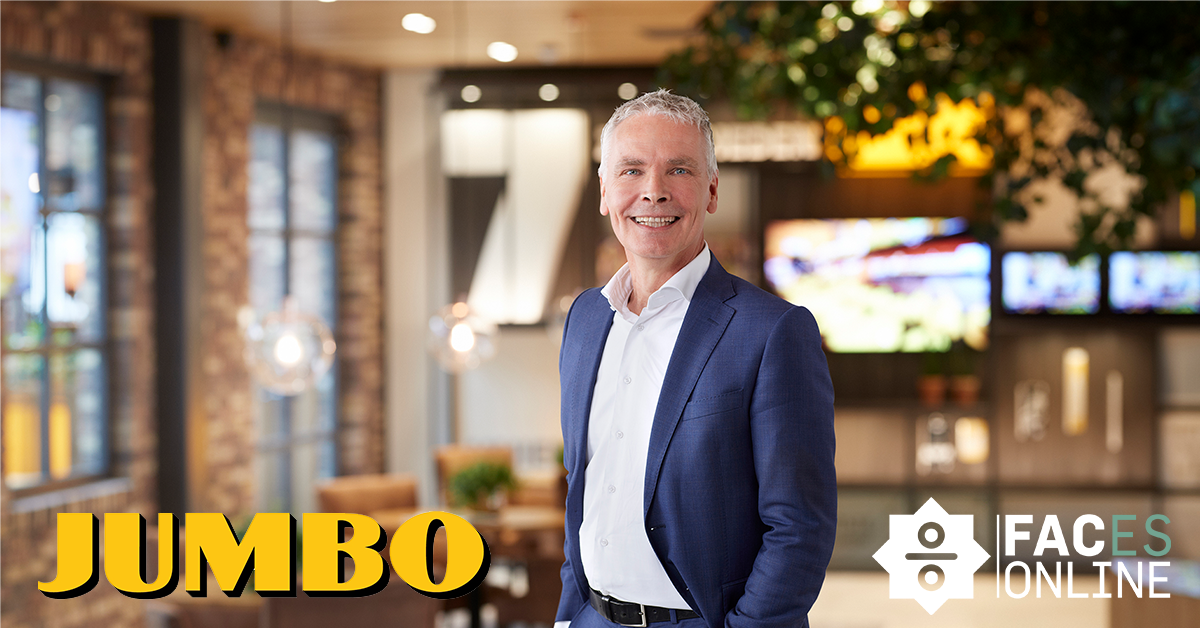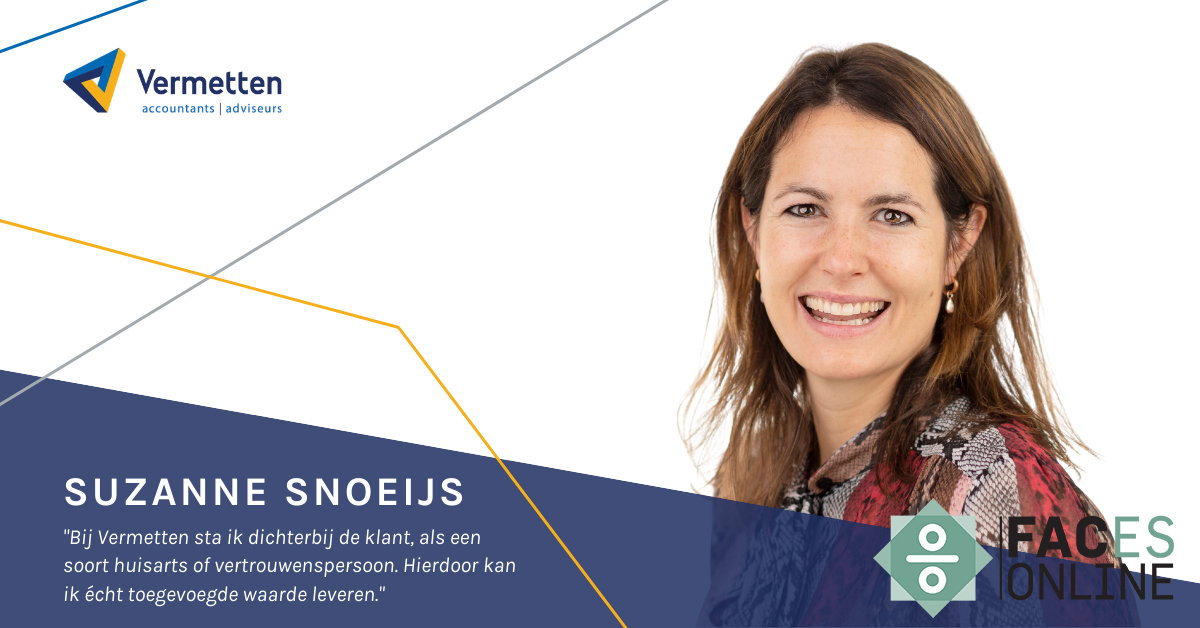For the Dutch version, click here My name is Peter van Erp. I am 55, married, and have two children. After my high school studies, I started to study Economics in Tilburg in 1985. Eventually, I graduated in Finance. I have always found it very interesting to look at how companies were valued, and what the rationale is behind certain price movements. Today, I am Executive Director of finance at Jumbo. Why did you start studying Economics? That’s a good question, why do you do anything? I knew already in the fourth grade of high school that I liked it and it was also the subject that appealed to me the most. So there was an intrinsic interest in that to know something about economics. I really liked business economics, but also general economics. I think these subjects are very telling about how the world works. Also, you have to understand history to understand general economics. What steps did you take after college? When I finished college in 1990, I didn’t know what I wanted to do. I thought everything was interesting. Then you let your environment inform you and after all the wisdom I picked up from that, I thought it was a good idea to go to an accounting firm. I worked there for 5 years and simultaneously did the postgraduate training RA in Tilburg. I started working at Unigro in 1995. That was one of the forerunners of the large food retail concern Laurus. So I left the world of accountancy. I liked accountancy, but not enough. I felt more attracted to the business than to accountancy, apart from the fact that it was very instructive. At Unigro I was a treasurer. Unigro eventually merged with De Boer Winkelbedrijven. As a result, a move to the head office in Amersfoort was planned. Then there comes a time when you have to choose: are we going to move or are we going to stay in the province of Brabant. I chose the latter option and left De Boer Unigro in 1998. I then came to Jumbo and saw the company change from a small family business to the concern it is today. Jumbo started 100 years ago as a wholesaler. Then we made the step to retail and with takeovers, we kept growing. Finally, in 2009 we made one of our biggest acquisitions, that of Super de Boer. We had to delist the parent company, which was twice the size of Jumbo. That was very exciting, but because of the conviction of our formula we knew we would make a success of it. After the takeover of C1000, Jumbo has grown into a concern with 10 billion euros in turnover and almost 100,000 employees. Why did you make the switch from accountancy to business? This switch has been very logical for me. After 5 instructive years in accountancy, I wanted to have more influence on business processes and be more responsible for implementing decisions, instead of just giving advice or a statement with the annual accounts. Was it a specific choice to work in the supermarket industry? I find FMCG very interesting and challenging. You often work in a very competitive environment and you have to be very agile. Food retail completely fulfills this. The traditional marketing P’s work directly on sales and profitability, so you also see short-term effects of the plans you have put in place. In terms of typology, food retail is not particularly complex. You buy something, you store it and you send it back to the store. Customers pay with cash at the till and you pay your suppliers on 30 or 60 days. Yet you may be surprised to learn that we base our assortment, shelf plans, layout and also selling prices on algorithms that have a lot of data behind them. Where in the past stores had a one size fits all approach, we have invested heavily to offer individual shelf plans per store that meet the eating and drinking habits of that area. So technical innovations will play a big role at Jumbo in the future? Big steps are being taken in this area nowadays. For example, there are already cashless stores. The checkout actually takes place the moment the product is taken from the shelf. At the moment it is still too complex to implement, but that is the direction in which it can eventually go. An enormous challenge is how to avoid compromising on service when you start automating and mechanizing. You also don’t want to turn a store into a very cold environment where you don’t see any people anymore. So at the moment, we are mainly working on making the supply chain more efficient. For example, a year ago we started using a fully mechanized distribution center in Nieuwegein. Here products are collected and then stacked on a roll container, without human intervention. These are investments of 100 million euros. To be able to finance this, having sufficient scale and profitability is self-evident. To what extent will online grocery shopping play a role in Jumbo’s business model? Online grocery shopping is an integral part of our business model. Since corona, it has made an enormous flight. Customers have become increasingly accustomed to it and also experience the convenience of online shopping. The competition is perhaps even fiercer than in the bricks-and-mortar world. The customer wants it and we follow the customer. The problem, or rather the challenge, is that the customer is hardly willing to pay for it. So here too we will have to have sufficient scale and mechanize the logistics processes to increase the return. Are you also planning to chase competitors like Gorillas and deliver groceries within minutes? That’s a tough question because if we have to do everything the competition is offering today, you have to be playing chess on a lot of boards. We just have to stay the course and continue to execute our own strategy. And that is
Controlling – Accounting’s long lost brother
For the Dutch version, click here For the accountancy students among us, it’s a familiar ritual by now; as soon as the future comes up, the majority of students hear the all-too-familiar song: first, complete the master’s program Accountancy, then start the postmaster CPA while at the same time, starting to work for example at Deloitte, EY, KPMG or PwC. There is, of course, nothing wrong with this road. After all, the CPA title is very valuable and as long as people have not been replaced by technology, we will also need enough inflow into the audit practice, and the financial sector in general. In addition, working in auditing can also be fun, provided that this is where your interests lie. The demand for the CPA title is therefore growing every year. However, the ever-growing demand for CPA students also has a downside: when people talk about accountancy these days, we only think about Chartered Accountants. However, there is another branch within accountancy; Controlling. What exactly does a controller do? Generally, a controller assists the board or management in understanding and maintaining the financial affairs of a company. The controller oversees a company’s finance department and often leads this team as well. The controller also deals with financial planning and reporting for the benefit of management. Simply put, a controller is concerned with the quality of the entire financial process and ensures that the results and planning are optimally communicated to management, in order to support decision-making. For a career as a controller, you generally don’t need additional training like a CPA. However, these courses do exist. The executive master: Register Controller (RC). If you complete this program, you will be listed in the NBA register, just like a CPA, as an additional quality stamp on your resume. Why RC or CPA? The big question now, of course, is why anyone should choose RC or CPA. One is no better than the other. Both have extensive knowledge of financial data, and both are post-master educated. So the difference does not lie in the level of education. In my opinion, it will mostly be where your interests lie. Of course, your interests lie in finance, otherwise, you wouldn’t even think about throwing yourself into the world of financials. The big difference is whether you like to evaluate a company internally or externally. As a controller, internally you will be mostly concerned with the processes within the finance department and steering for growth and results. As an accountant in the audit practice, you will mainly focus on the correctness of the external reporting and compliance with laws and regulations. The question is therefore what you yourself find most interesting. It’s worth noting that there is a trend where we see a lot of chartered accountants choosing to switch to a controlling position in the business world after a number of years in the audit field. For example, many controllers and CFOs at large Dutch companies used to be CPAs. Think of the CFOs of Adyen, ASML, and Unilever. For those students who already know that they have the ambition to eventually hold a position as CFO: there is also another path than becoming a CPA. The road to RC is about as long, but if we are to believe the universities, you are slightly better prepared for the position you will eventually hold. Boxes The advice I would like to give current and future Accountancy students: do not immediately put yourself into the box of the chartered accountant. Of course, it’s a good profession with good prospects, but there are many other interesting jobs that are just as well suited to financial education. In my opinion, that is also the beauty of training in financial disciplines; at the basis, we all understand financial matters, and eventually, you can end up in plenty of amazing places. Even without a CPA title, you have a degree in your pocket that guarantees your ability to critically think in a certain field. And that piece of paper will get you there.
Working at Vermetten
For the Dutch version, click here Suzanne Snoeijs was a member of FST about 15 years ago, now better known as Asset | Accounting & Finance, where she organized the StudyTour to Boston at the time. She studied Master Accountancy at Tilburg University and is now employed at Vermetten. Can you tell us something more about yourself? I used to study at Tilburg University, where I did the bachelor Business Economics and then the master Accountancy. I was a member of FST at the time and organized the StudyTour to Boston. I have always enjoyed my time with FST and have good memories of it. After my master’s I started working at PwC. I started at the Breda office, where I worked for four years. Then I switched to the Rotterdam office, where I worked for another four years. I was able to gain more experience in Rotterdam because that’s where the larger clients were and where the IT Audit department was located. After eight years I made the switch to a smaller office. I first worked at Witlox for a year and then switched to Vermetten, where I have been working for about six years now and will soon become a partner. What is the difference between a large and small office? At Vermetten I am closer to the client. In Accountancy, it is difficult to provide added value. If the relationship with your client is good, you can deliver this much better and you also get more satisfaction from it. You are more like a doctor than a confidant of the client, which means you get completely different questions than just about the audit of the annual accounts. Sometimes people just want to talk about something and tell their story. Clients then give me a call, even though I can’t always help them. At the larger offices, you are forced into a kind of checklist culture. I like to audit based on common sense because I think you can then do a much better quality audit. Why did you start at PwC and, if you could do it over, would you make the same choice? I wanted to learn a lot, so a Big 4 firm was my preference. I had been to Barcelona with PwC. The people at PwC and the culture suited me, so choosing PwC was easy. The training program at PwC is fantastic and you start with a large group of people, which is different at smaller firms. You also learn a lot on the job. Smaller firms have smaller clients and you can often get to know them from the beginning, front to back. The learning curve at a smaller firm is, therefore, in my opinion, somewhat steeper. So it just depends on what suits you as a person. “You are more like a doctor than a confidant of the client, which means you get completely different questions than just about the audit of the annual accounts.” Can you tell us a little bit more about Vermetten? John started about 25 years ago on his own. When I started at Vermetten 6 years ago, about 35 people were working in 2 locations. This makes you have a very different culture. You don’t have a consultation structure where 20 people have to be involved in the decision-making. In recent years many other branches have joined. At the moment we have about 200 people spread over 7 branches. This means that we are entering a new phase in terms of structure. This includes a partner structure, so this year 8 new partners will join. These are all people who already have a certain responsibility and will grow in their function. We also work with a team of 15 people on the audit. The nice thing about the team size is that we all know each other very well. Another nice thing is that it is not as hierarchical as I was used to. We help each other when necessary and socializing is crucial to do the job well. We have a relatively young team. The majority are between 20 and 35 years old. We have many different types of clients and do anything that is not too difficult. So we don’t do hospitals and municipalities, because you need industry-specific knowledge for that. Furthermore, we mainly have smaller production and profit companies in our portfolio, as they are highly represented in this region. Besides the audit team, we have many other teams, offering any service which an SME needs. Here you can think of: corporate finance, tax, human resources, compilation, salary, and legal. We want to be able to answer any question a client might have. What is your future perspective? Many students, clients, and other people do not yet know us very well. We would like to continue to grow as an organization because if you grow you also have a good development perspective for new talents. Ultimately, we want to become the best office in Brabant. Furthermore, our strategy is to remain active in the region and focus on Brabant. This is also where the bulk of our portfolio is located. How do you experience corona time? I work at home as much as possible. We try to limit contacts at the office and with customers. Sometimes this is difficult, especially if we have to count the stock, then we do have to visit the customer. Furthermore, not everyone must get overworked. We have a team meeting every week where we discuss the progress and see if we are still on schedule. I find it important to clear my head once in a while, which I do by going for a walk outside, playing tennis a few times a week, making large jigsaw puzzles, or coloring by number, among other things. Everyone is in the same situation and yes, sometimes you hear a dinosaur cry, but that has its charms too. Why did you choose Accountancy and do you have any other tips



